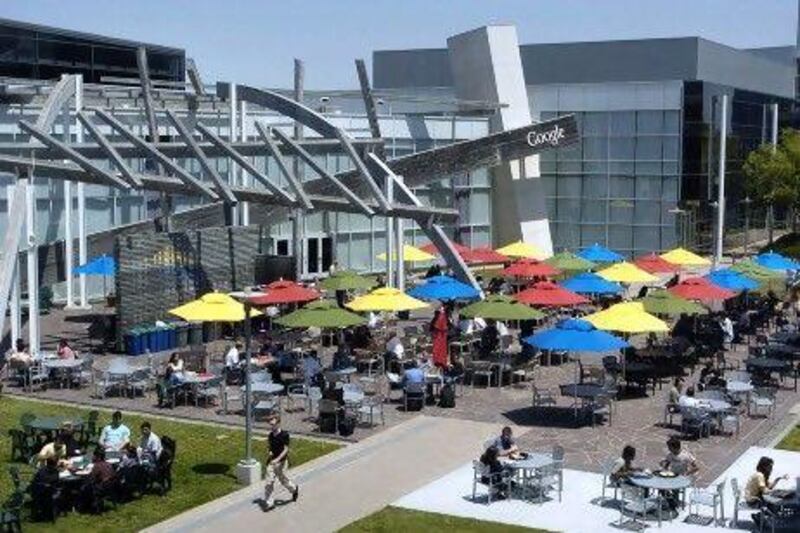A decade after the dotcom crash, Silicon Valley is on a roll again. With venture capital and investment now flooding in once more, technology companies in the US are expanding operations and hiring fast.
Apple is building a new 1 million square foot saucer-shaped headquarters in Cupertino, California, with Facebook also set to move soon into a new development of similar size in nearby Menlo Park. In neighbouring Mountain View, Google has gone from zero to the town's biggest employer in less than a decade. Across town, LinkedIn, the social networking site for professionals, is reported to have doubled its workforce last year.
With Facebook's initial public offering (IPO) widely expected to pull in more than US$100 billion (Dh367.3bn), Silicon Valley is attracting levels of investment not seen since the dotcom crash of a decade ago. According to the Los Angeles Times, Bay area startups alone received more than $2.3bn of venture capital in the first quarter of this year, a 53 per cent increase compared with the same period last year. Companies such as Apple, Google and Facebook also have hundreds of millions of dollars in cash and are prepared to invest heavily in startups that can help them to bring new products and services to market faster.
"The knock-on effect of the social networking boom is happening fast, as evidenced by New York's Silicon Alley and opportunities emerging elsewhere," says Carter Lusher, an analyst based in California at the international research firm Ovum.
The success of Silicon Valley companies is also generating a global demand for information technology (IT) that is now having an effect on technology centres across the world.
The chip maker GlobalFoundries is working with the Advanced Technology Investment Company (Atic), a specialist investment company created by the Abu Dhabi Government, to create what Ibrahim Ajami, the Atic chief executive, says will be "the industry's next innovation cluster".
According to GlobalFoundries, the goal for the Abu Dhabi site is to be the Middle Eastern hub of a global technology and manufacturing network.
But the jury is still out as to whether centres such as Abu Dhabi's or Dubai's fledgling Silicon Oasis can ever really emulate the success of the original Silicon Valley. According to some analysts and industry watchers in the US, California has managed to breed a unique and self-sustaining business culture capable of constantly refreshing the IT industry with innovative concepts and products.
"Silicon Valley has unique advantages that enable it to grow not only new companies but also new industries such as social networking," Mr Lusher says. "If they wish to emulate Silicon Valley's success, somewhere such as Dubai Silicon Oasis has to start from the foundations and build the right underlying culture before starting to work their way up."
While the "hire-and-fire" philosophy of US employers gives little security to employees, the flexibility of Silicon Valley's labour market is considered a contributing factor to its business culture.
"Something that is not widely understood about Silicon Valley is the way in which the state of California does not allow companies to force employees to sign non-competition agreements," Mr Lusher says. "In practice, this means someone can quit their company and walk across the street to a competitor or even start their own rival company."
Silicon Valley also encourages entrepreneurs to start new companies and is not critical of business failures if they provide useful business experience.
"The attitude of Silicon Valley is: 'We don't mind if you fail as long as you do it quickly and learn'," Mr Lusher says.
Other factors include the proximity of top technology universities such as Stanford and Berkeley on Silicon Valley's doorstep. According to analysts, a good mix of talent is also important, with both veteran and new staff available. There also needs to be a mix of small entrepreneurial companies and large corporations willing to nurture new ideas. The proximity of venture capital firms offering finance to new and existing technology companies is also crucial, as is the presence of copyright lawyers.
But Silicon Valley's crown may not be as secure as the industry pundits think. Locations such as Shanghai are already starting to attract international talent and are increasingly supported by first-class universities. With production increasingly shifting to locations such as Asia and the Middle East, California may soon have to look to its laurels.
Although investors are keenly anticipating opportunities such as Facebook's IPO, there is growing global investor mistrust of the US's boom-and-bust culture, which is particularly strong in its technology sector.
The tendency of Silicon Valley companies to take investors on a roller coaster ride is likely to be proven once again as social networking services drive the new dotcom boom. But once the dust settles on the current boom-and-bust cycle, investors and skilled engineers may start to head for new technology centres in more robust and faster-growing economies outside the US.





